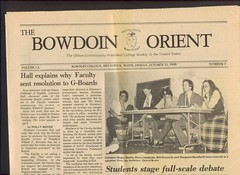What Were the Odds?
Within the space of a week, I posted this page from the Bowdoin Orient (the oldest continuously-published college weekly in the US), that cites the scintillating political-debate skills of Margaret Bamforth [Adam] marshalled in support of Barry Commoner for President in 1980 — and Michael Bérubé posted a photo of himself kneeling at a sidewalk star dedicated to Barry Commoner, noting that he cast his first presidential vote for Commoner in ’80.
How many people even remember that “the Citizens Party” existed? Margaret and I put a ton of energy into the Steering Committee for the Citizens Party in the great state of Maine that year. Bérubé has changed course back to voting for the more tolerable of two unsatisfactory options; Margaret and I refuse to lend our support to candidates we don’t believe in. But twenty-four years ago, all three of us hoped that we could break this logjam. . . .
